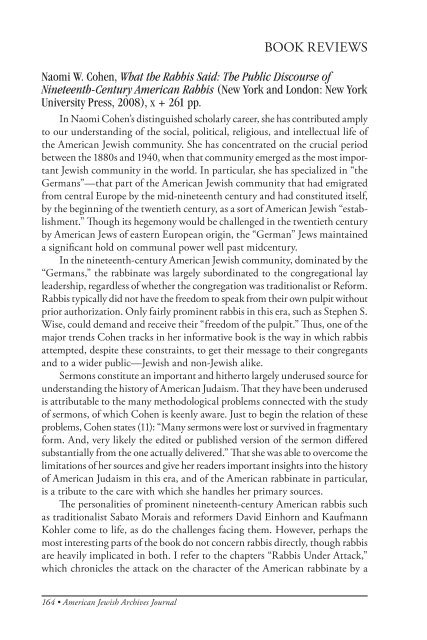The American Jewish Archives Journal, Volume LXI 2009, Number 1
The American Jewish Archives Journal, Volume LXI 2009, Number 1
The American Jewish Archives Journal, Volume LXI 2009, Number 1
You also want an ePaper? Increase the reach of your titles
YUMPU automatically turns print PDFs into web optimized ePapers that Google loves.
164 • <strong>American</strong> <strong>Jewish</strong> <strong>Archives</strong> <strong>Journal</strong><br />
BOOK REVIEWS<br />
Naomi W. Cohen, What the Rabbis Said: <strong>The</strong> Public Discourse of<br />
Nineteenth-Century <strong>American</strong> Rabbis (New York and London: New York<br />
University Press, 2008), x + 261 pp.<br />
In Naomi Cohen’s distinguished scholarly career, she has contributed amply<br />
to our understanding of the social, political, religious, and intellectual life of<br />
the <strong>American</strong> <strong>Jewish</strong> community. She has concentrated on the crucial period<br />
between the 1880s and 1940, when that community emerged as the most important<br />
<strong>Jewish</strong> community in the world. In particular, she has specialized in “the<br />
Germans”—that part of the <strong>American</strong> <strong>Jewish</strong> community that had emigrated<br />
from central Europe by the mid-nineteenth century and had constituted itself,<br />
by the beginning of the twentieth century, as a sort of <strong>American</strong> <strong>Jewish</strong> “establishment.”<br />
Though its hegemony would be challenged in the twentieth century<br />
by <strong>American</strong> Jews of eastern European origin, the “German” Jews maintained<br />
a significant hold on communal power well past midcentury.<br />
In the nineteenth-century <strong>American</strong> <strong>Jewish</strong> community, dominated by the<br />
“Germans,” the rabbinate was largely subordinated to the congregational lay<br />
leadership, regardless of whether the congregation was traditionalist or Reform.<br />
Rabbis typically did not have the freedom to speak from their own pulpit without<br />
prior authorization. Only fairly prominent rabbis in this era, such as Stephen S.<br />
Wise, could demand and receive their “freedom of the pulpit.” Thus, one of the<br />
major trends Cohen tracks in her informative book is the way in which rabbis<br />
attempted, despite these constraints, to get their message to their congregants<br />
and to a wider public—<strong>Jewish</strong> and non-<strong>Jewish</strong> alike.<br />
Sermons constitute an important and hitherto largely underused source for<br />
understanding the history of <strong>American</strong> Judaism. That they have been underused<br />
is attributable to the many methodological problems connected with the study<br />
of sermons, of which Cohen is keenly aware. Just to begin the relation of these<br />
problems, Cohen states (11): “Many sermons were lost or survived in fragmentary<br />
form. And, very likely the edited or published version of the sermon differed<br />
substantially from the one actually delivered.” That she was able to overcome the<br />
limitations of her sources and give her readers important insights into the history<br />
of <strong>American</strong> Judaism in this era, and of the <strong>American</strong> rabbinate in particular,<br />
is a tribute to the care with which she handles her primary sources.<br />
<strong>The</strong> personalities of prominent nineteenth-century <strong>American</strong> rabbis such<br />
as traditionalist Sabato Morais and reformers David Einhorn and Kaufmann<br />
Kohler come to life, as do the challenges facing them. However, perhaps the<br />
most interesting parts of the book do not concern rabbis directly, though rabbis<br />
are heavily implicated in both. I refer to the chapters “Rabbis Under Attack,”<br />
which chronicles the attack on the character of the <strong>American</strong> rabbinate by a

















